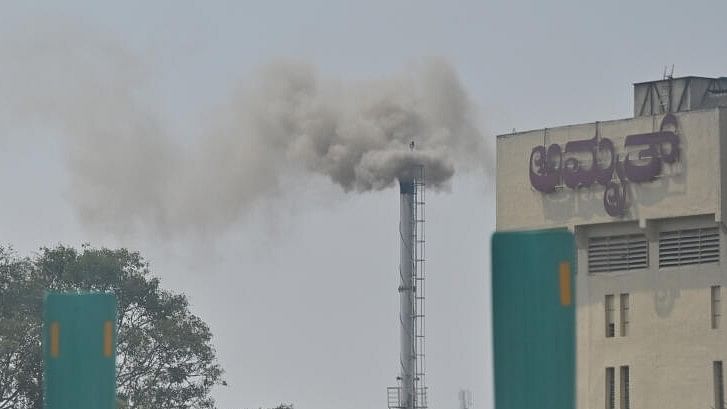
Representative image of air pollution by industries.
Credit: DH Photo
Mumbai: Renewables can cut 17 per cent of India’s heavy industry emissions by 2030, according to a report by Ember, an independent energy think tank that aims to accelerate the clean energy transition with data and policy.
This report indicates possible near and long term strategies to smash emissions as India negotiates with the European Union bloc on mechanisms to comply with the Carbon Border Adjustment Mechanism (CBAM).
CBAM is a regulatory framework that imposes a carbon tariff on imports to the EU.
Aditya Lolla, Asia Programme Director at Ember, said: “With emissions-related trade regulations like CBAM are expected to take effect soon, understanding the potential for near-term emission reductions
is crucial for Indian heavy industries. Renewables-based electrification also offers multiple co-benefits to India’s wider energy ecosystem. It can open up multi-million dollar private investment opportunities,
stimulate India’s clean energy manufacturing sector and propell India towards becoming a global leader in clean energy.”
To fully decarbonise their electricity use and remain competitive in the global market, India’s heavy industries require 120 GW of dedicated renewable energy capacity by 2030, according to an Ember press statement.
The report focuses on the steel, cement, petrochemicals, aluminium and ammonia sectors. Decarbonising these emission-intensive “heavy” industries can significantly benefit both India’s industrial sector and renewable energy ecosystem.
Currently, 11 per cent of energy consumption in these heavy industries comes from electricity, with the rest from fossil fuel-based thermal energy. Based on industry growth projections, electricity demand for
heavy industries are expected to rise by 45 per cent. Meeting this increased demand with renewable energy could help to avoid 180 million tons (Mt) of CO2, equivalent to the total annual emission of the Netherlands.
Duttatreya Das, an independent consultant and the report’s lead author said: ”Besides being one of the most promising levers for decarbonising industries, renewable based electrification offers multiple co-benefits. It allows industries to benefit from low cost renewable power, improves grid flexibility, and most importantly, improves air quality within industrial facilities.
Switching to renewables immediately and ensuring clean air within industrial premises needs to be a people-first strategy for heavy industries.”